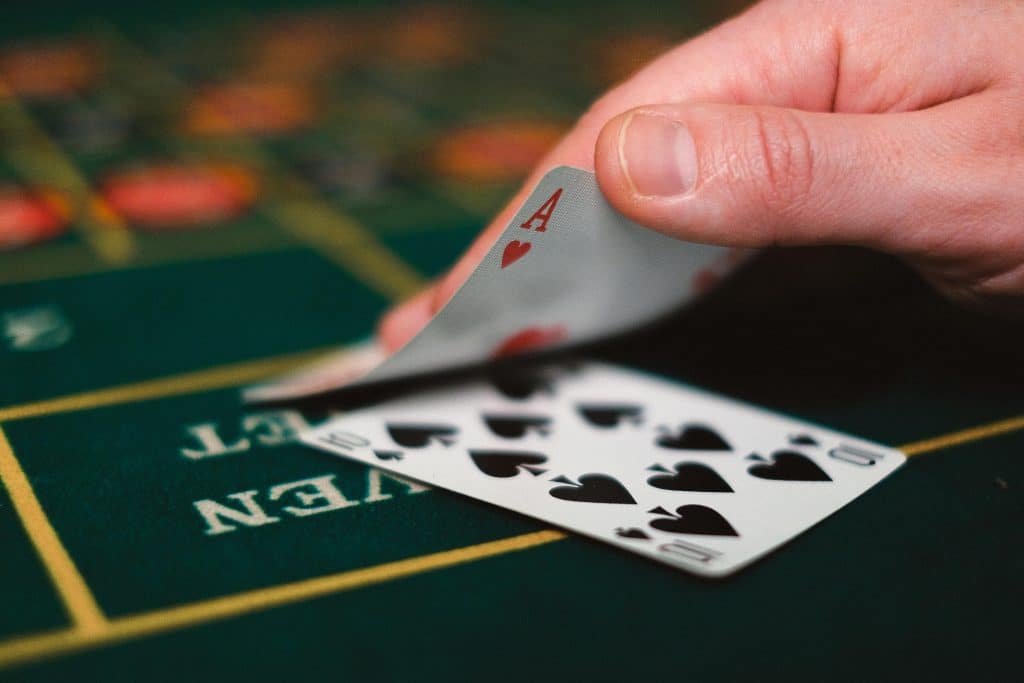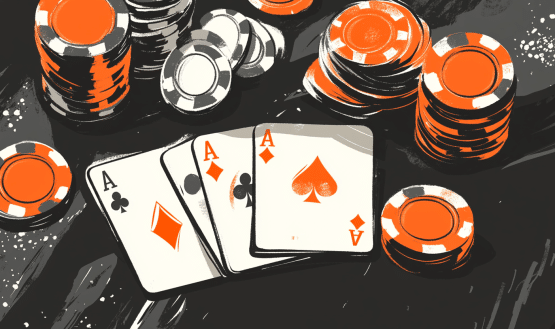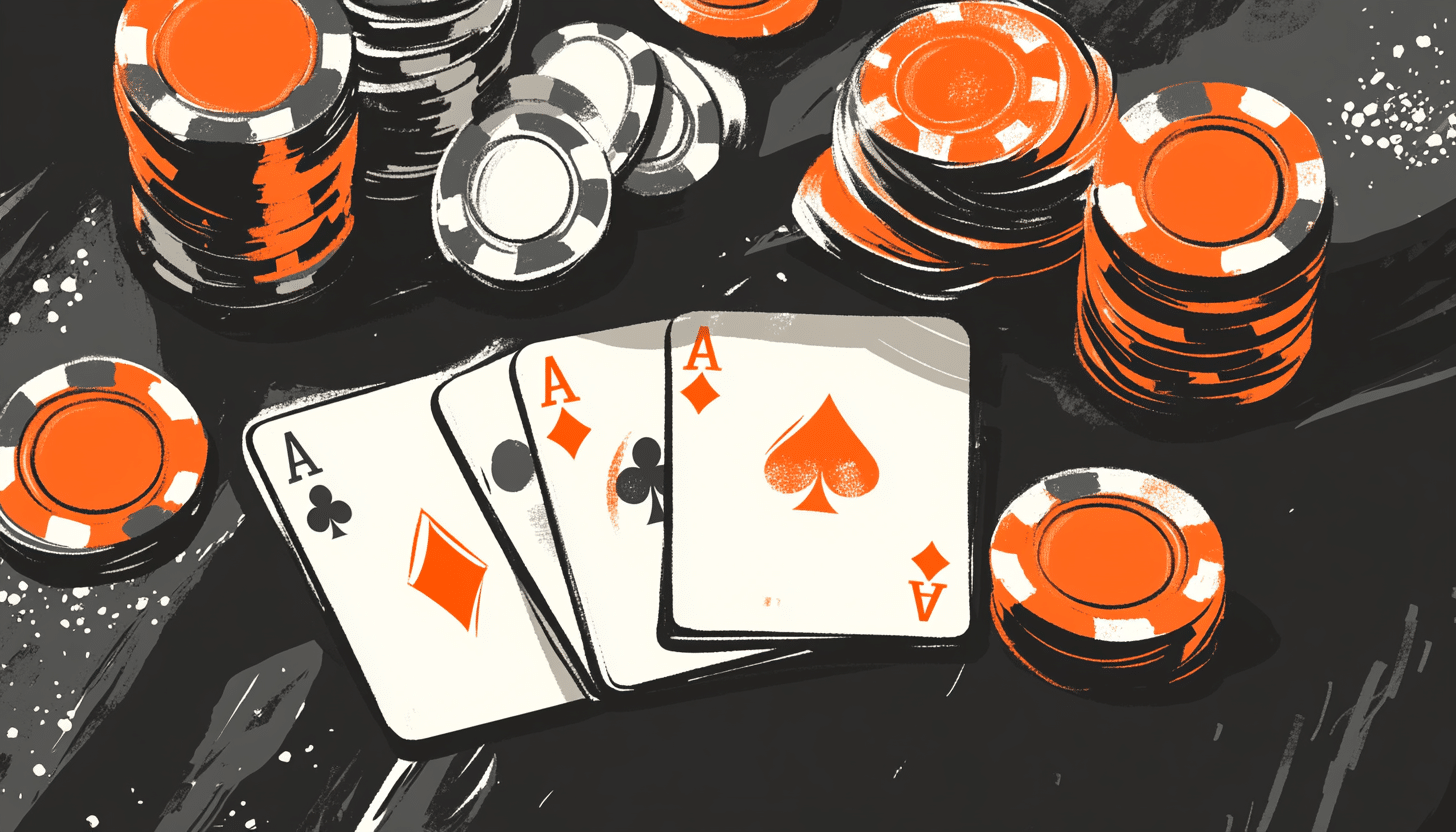Online poker may seem like a game of luck, but it’s driven by skill and strategy. Success requires a solid strategy, including improving your preflop game, mastering bluffing, and managing your bankroll. Understanding poker math gives you an edge.
Winning is about more than just playing or folding—it’s about choosing the right games, playing strong hands aggressively, and using strategic insights. Every hand, bet, and decision advance your poker skills.
Key Takeaways
- Mastering poker strategies sharpens your decision-making.
- Medium-strength hands need careful play to boost profits.
- Online poker blends skill with strategy and psychological insight.
- A solid pre-flop strategy is essential for success, as is managing your bankroll and understanding variance.
- Selecting the right games and playing strong hands aggressively, with attention to bet sizing and board texture, enhances your chances of winning.
1. Mastering Preflop Play to Set the Stage
Mastering tight preflop play is crucial. It’s about more than just choosing the right hands—it’s about laying a solid foundation for the entire hand. Sticking to a disciplined preflop strategy, even when tempted to play more loosely, can significantly impact your results, especially in fast-paced online poker games.

The table below highlights common pre-flop situations and recommends actions based on hand strength and position. The recommendations are drawn from our expert’s gameplay experience to ensure practical effectiveness.
| Hand Type | Early Position | Middle Position | Late Position |
|---|---|---|---|
| Ace-Ace | Raise | Raise | Raise |
| King-Queen Suited | Fold | Call | Raise |
| Seven-Seven | Call | Call | Raise |
| Jack-Ten Offsuit | Fold | Fold | Call |
2. Embracing the Art of Bluffing
In poker, a strong bluffing technique can be a game-changer. Bluffing isn’t just about pretending to have a better hand—it’s about knowing when and how to apply pressure on your opponents. Mastering bluffing involves reading the table, controlling your tells, and timing your bluffs effectively.
Success in bluffing relies on maintaining a psychological edge, telling a convincing story with your actions, and strategically switching between honest and deceptive play. Developing this skill can make opponents doubt themselves, turning poker into a battle of strategy and nerves rather than just luck.
| Technique | Application | Expected Outcome |
|---|---|---|
| Semi-Bluff | Use with a drawing hand that could improve later. | Put pressure on opponents with a chance of a big hand. |
| Pure Bluff | Do when opponents seem weak and the pot is worth it. | Win big by making opponents fold out of fear. |
Pressure poker opponents by changing up your play. Being able to switch between being honest and deceptive makes you a formidable opponent. Whether it’s a small or big game, surprising your opponents is a powerful tool to make them fold unexpectedly.
3. Bankroll Management
Effective poker bankroll management is crucial for long-term success. It helps players navigate the game’s ups and downs, allowing them to stay in the game and capitalize on big wins.
Maintaining Discipline in Financial Strategy
To be good at poker financial strategy, you must be disciplined with your bankroll to protect you from significant losses.
- Set strict limits on how much you risk per game and when to move up in stakes.
- Risk only a small portion of your bankroll on each game to prevent significant losses.
- Establish a maximum buy-in percentage to avoid major losses during volatile sessions.
- Avoid impulsive decisions to play at higher stakes without adequate bankroll.
- Regularly review and adjust your strategy based on game dynamics and skill level.
Understanding Variance in Poker
Understanding poker game variance is key. Variance can greatly affect your bankroll, even if you’re a skilled player. Knowing that winning and losing are normal helps you make better decisions during tough times.
Using tools and software to track your game can give you important insights. This data helps you adjust your bankroll strategies to match your real win rate.
4. Strategic Approaches to Medium-Strength Hands
In poker, managing medium-strength hands effectively is crucial. The main online poker strategy is passive play: keeping the pot steady rather than trying to build it. This approach helps protect against blinds and counteract aggressive players.
Key Strategies:
- Bluff-catching: If you face frequent bluffs, consider checking to let opponents believe you have the upper hand before calling their bluff.
- Multi-way pots: Play passively to avoid risking too many chips while observing other players’ actions.
- Post-flop play: If the flop doesn’t significantly improve your hand, maintain a passive stance to stay in the game without committing too many chips.
By applying these strategies, you can turn medium-strength hands into effective plays. The goal is to be strategic and patient, avoiding unnecessary aggression while waiting for the right moment to act.
5. Game Selection: Finding the Best Seat
Selecting the right table at the best online Poker sites is crucial for improving your chances of winning. It involves more than just knowing the rules; it’s about finding where you have an advantage.
Key Strategies:
- Look for Passive Players: Tables with players who frequently limp or fold early tend to offer better opportunities.
- Seek Large Pots: Games with big pots relative to the stakes can be more profitable.
- Watch for Frustration: Players showing signs of frustration or impatience are often easier to beat.
Adjusting your table choice based on these factors can significantly boost your results. Regularly reassessing your table selection helps ensure you play in the most advantageous conditions.
| Table Feature | Desirable Traits | Reasons for Choice |
|---|---|---|
| Pot Size | Large | Greater opportunities for significant wins |
| Player Behavior | Passive, predictable | Easier to strategize and make effective decisions |
| Blind Levels | Consistent with your bankroll | Prevents playing out of your comfort zone economically |
6. Maximizing Earnings with Strong Hands through Aggression
When you have a strong hand, switch to an aggressive strategy to maximize your winnings. This strategy involves making smart moves that put pressure on opponents and force them to make difficult decisions.
Key Strategies:
- Aggressive Play: With a strong hand, being aggressive can make opponents fold or commit too much. This requires good timing and an understanding of your opponent’s psychology.
- Balanced Bet Sizing: Adjust bet sizes to extract value while concealing the strength of your hand. This forces opponents to invest more to compete.
- Protecting Equity: Focus on betting and raising to protect your equity and control the pot size. The goal is to get opponents to put money in when they are likely to lose.
| Online Poker Strategy Element | Benefits |
|---|---|
| Consistent Aggression with Strong Hands | Compels opponents to make difficult decisions, potentially leading to mistakes. |
| Calculated Bet Sizing | Extracts maximum value from each hand while disguising hand strength. |
| Equity Protection | Maximizes potential returns by controlling the pot with strategic betting and raising. |
7. Harmony of Practice and Theory in Poker Strategy
Balancing practical poker study with theoretical insights is crucial for improving your game. Integrating practice with strategic knowledge helps you develop a solid game plan and enhances your instincts.
- Practical Poker Study: Continuously review and refine your play to identify areas for improvement.
- Application of Poker Theory: Implement learned strategies, such as understanding ranges and pot odds, and adapting to player habits.
- Regular Practice: Frequent play, whether online or in person, helps test and refine your strategies.
8. Decision-Making in Poker: Value Bets vs. Bluffs
Choosing between value betting and bluffing is crucial, especially at the river. This decision should be informed by your understanding of hand ranges, board texture, and your opponent’s betting patterns.
- Value Betting: Bet when you believe your hand is stronger than your opponent’s likely range. Evaluate the odds and your opponent’s history.
- Bluffing: Use bluffing when the board suggests a strong hand that might scare your opponent into folding. Understand how your opponent reacts to pressure.

9. The Mathematics of Bluffing on Each Street
Bluffing effectively involves understanding the mathematics of poker, including equity and pot odds.
- Equity and Pot Odds: Calculate pot odds to compare the cost of a call with the potential reward. Combine this with your hand equity to make informed betting decisions.
- Bluff Frequency and Timing: Early in the game, frequent bluffing can build the pot. As the game progresses, bluff less often to maintain credibility.
| Street | Optimal Bluffing Frequency | Equity Required | Pot Odds |
|---|---|---|---|
| Flop | High | Low | 3:1 |
| Turn | Moderate | Medium | 2:1 |
| River | Low | High | 1:1 |
Conclusion
Learning to play poker at online casinos involves continuous improvement and strategy refinement. In summary, below are the essential online poker strategies for success:
- Starting Strong: Begin each hand with a solid setup.
- Bluffing and Bankroll Management: Master bluffing techniques and maintain discipline with your bankroll to manage luck and risk effectively.
- Advanced Tactics: Use medium-strength hands wisely, select the right games, and balance bold plays with strong hands.
- Decision-Making: Make strategic choices about betting and bluffing to enhance your play.
Combining theory with practice will refine your skills and increase your success. Use these insights to strengthen your online poker game and excel in a competitive environment.
CoinPoker - Top Crypto Online Poker
- With Native Mobile App
- Wide Selection of Poker Games
- Play With Crypto - BTC, ETH, USDT, and More
- Outstanding Tournaments and Prize Pools
Related
FAQs
What are some essential online poker tips for beginners?
For beginners, start by learning the basics. Improve your preflop game and learn about bluffing. Also, manage your bankroll well and pick profitable poker games. Keep practicing and learning to get better at poker.
How can I develop a tight and disciplined preflop strategy?
To play tight preflop, set precise preflop ranges for different situations. Stick to these ranges and fold when the odds are against you. This approach builds a strong foundation for your hand.
What is the importance of bluffing in poker?
Bluffing is key in poker. It puts pressure on opponents and helps you win pots with weak hands. Learning to bluff well keeps opponents guessing and gives you an edge in big pots.
What strategies should I use when playing medium-strength hands?
Play medium-strength hands passively. They're great for catching bluffs and protecting your range. Avoid overbetting these hands to keep your play balanced and hard to read.
How does bankroll management contribute to my poker success?
Good bankroll management means playing within your means and handling poker's ups and downs. Stick to consistent buy-ins and avoid chasing losses or playing too high. This keeps you financially safe.
What factors should I consider when selecting poker games and seats?
Choose games with less skilled players for better profits. Consider your position and seat, especially if you're next to aggressive players. Consider your skill level, comfort, and potential earnings before joining a game.
When should I use an aggressive strategy with my strong hands?
Be aggressive with strong hands to build pots and earn more. Bet and raise to stop opponents from getting free cards that could beat you. But think about bet sizing and the board's texture for the best results.
How do I balance theory with practice in my poker strategy?
Balance theory with practice by studying the game and applying what you learn. Review hand histories, join poker forums, and use simulators to practice. Practical experience sharpens your skills and adapts theory to actual games.
What should I be considering when deciding between value betting and bluffing?
Choose between value betting and bluffing based on your hand and your read on your opponent. Value bet if you think you're ahead—bluff to force a fold or when your hand's equity is low. Consider your opponent's style, the board, and your range.
How does an understanding of mathematics help with bluffing in poker?
Math helps you know the best times to bluff by understanding pot odds, equity, and optimal bluff frequencies. It helps you balance your strategy and keep your range hard to read. This knowledge leads to profitable bluffs at the correct times.
References
- 10 poker strategy tips that will boost your game (no date) Mobile Premier League(MPL). Available at: https://www.mpl.live/poker/tips-to-play-poker
- B., D. (2023) 10 quick poker tips that will help your game in 5 minutes, Upswing Poker. Available at: https://upswingpoker.com/quick-poker-tips-texas-holdem/
- Williams, N. (no date) 12 Advanced Online Poker Tips Used by Pros [2024], 12 Advanced Online Poker Tips Used By Pros [2024]. Available at: https://www.blackrain79.com/2019/09/online-poker-tips.html

